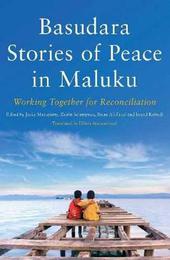
|
Basudara Stories of Peace from Maluku: Working Together for Reconciliation
Paperback / softback
Main Details
Description
In 1999, in the midst of the conflict that caused great suffering, when many people were trapped and forced to be directly or indirectly involved in the raging violence, not a few Moluccans in their own different ways stood their distance and maintained a critical attitude to the conflict. At the same time, they started to fight for peace. This book is filled with their stories. In addition to being a sign of respect for their actions, this documentation aims to record each of these experiences and personal testimonies, so they do not just evaporate into thin air. Their testimonies also contain very valuable lessons not just for the people of Maluku, but for the whole of humankind, in the present and in the future. It is time that good stories, containing voices for peace (not violent conflict), can be heard more from Maluku. If we really want to see peace, why dont we start to read and write more often about it or talk about it? This book is important reading for the people of Maluku, or other Indonesians who have experienced violent conflict, but also for others who want to avoid the same sort of violent conflict. Policy makers, religious leaders and civilians need to read this book -- they will draw many lessons from these stories.
Author Biography
Jacky Manuputty is a minister in the Protestant Church in Maluku, and Director of the Research and Development Agency (Balitbang) of the Protestant Church in Maluku (GPM). He is the Founder and Director of the Inter-Faith Organisation in Maluku (LAIM). He has been awarded the Maarif Award 2005 in the category of peace worker; and the Tanenbaum Award, New York, USA in 2012 for the category of Peacemakers in Action. Zairin Salampessy, usually known as Embong, is a graduate of the Fisheries Faculty, Unpatti. He was known as a pavement artist in Ambon from 1987 to 1992. In 1994, Suara Maluku newspaper asked him to draw caricatures and so he became a journalist, an assistant editor and then senior editor until 1998. He then joined the Baileo Maluku Network NGO in Ambon. When the conflict struck Ambon in 1999, he, together with a number of colleagues, immediately formed a team of Muslim and Christian volunteers, who worked to handle the victims of the conflict. He continued doing this until he moved to Jakarta, where he was involved in advocacy at a national and international level through the Advocacy Team for Case Solving in Ambon (TAPAK). While at TAPAK Ambon, he was on several occasions, part of the Indonesian NGO delegation to the Assembly of the UN Human Rights Commission in Geneva, Switzerland. He has now returned to Ambon and has become a freelance photographer for the Antara Photographic Bureau and a volunteer in the Inter-Faith organisation in Maluku. Ihsan Ali-Fauzi is the Director of the Centre for Studies in Religion and Democracy (PUSAD), Paramadina Foundation and a lecturer at Paramadina Graduate School, Jakarta. He studied history and political science at Ohio University, Athens, and the Ohio State University (OSU), Columbus, both in the US. He writes for a number of national mass media, including Kompas, Koran Tempo, Majalah Tempo, The Jakarta Post and journals such as Studia Islamika and Asian Survey. As part of the PUSAD Paramadina team, he published Disputed Churches in Jakarta (2011) and Pemolisian Konflik Agama di Indonesia [The Policing of Religious Conflict in Indonesia] (2014). Irsyad Rafsadi is a researcher at the Centre for Study in Religion and Democracy (PUSAD), Paramadina Foundation, Jakarta. He is responsible for the Ahmad Wahib Award Program in the same foundation (20132014). Irsyad is a graduate of the Syariah Faculty, of the State Islamic University (UIN) Syarif Hidayatullah, Jakarta. In addition to writing for Koran Tempo, Majalah Tempo and Jakarta Globe, he has, as part of the PUSAD. Hilary Syaranamual is one of the founders of Amansplus Ministry, which is involved in humanitarian activities. APM started in Malang, East Java, in October 1999, and has continued in Maluku from July 2005 until the present. Having lived in Indonesia since 1983, she moved to Ambon in 1993.
ReviewsAll of the personal stories in this book have been conveyed with amazing honesty. It was not easy, to display deep personal feelings in public. More amazingly, all the contributors come from the communities which used to face each other with angry scowls. This is sufficient to make this book an historical monument. -- Gerry van Klinken If this book was published to remember it [the conflict in 1999], then there is a spirit of emancipation: what can be done so that it is never repeated? What means are provided for the diverse society, so that people can work together and take steps towards the future, full of confidence? -- Rizal Panggabean
|